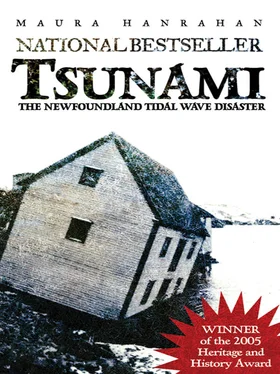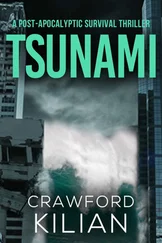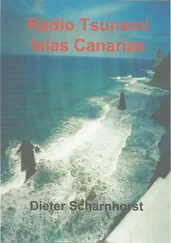In the face of such grief, Albert and Thomas felt like intruders rather than escorts and looked at the floor. Also in the room stood Bertram’s parents, whose house had also been swept away, and their four other children. Herbert and Ellen Bonnell were here, too, with their three young children. Their one storey, two room house had been destroyed; like the other Bonnells, they had absolutely nothing left. Now there was nowhere to move in Hannah’s packed little house.
As Nurse Cherry looked at Bertram’s ceaseless pacing, trying to think what to do, Hannah said of the dead children, “Their names were John, called after his brother, and Clayton.”
At that, the boys’ mother let out another wail.
The little bodies were dressed in their winter clothes, with woolen caps on their heads and mittens covering their blue hands. The nurse wondered if they might have survived if they’d had less clothes on. She had no idea of the fate of the Hipditch children of Point au Gaul, who had drowned in their pajamas, or the Rennie children of Lord’s Cove, who died in their day wear when the first wave crashed into their home.
Dorothy Cherry spoke directly to Hannah.
“Has someone told Bertram the children are dead?” she asked.
“Oh, yes,” Hannah answered quietly, releasing a sigh. “He knows they’re dead but he can’t accept it yet. We think he’ll accept it if we just give him a bit of time.”
The English nurse reflected on their wisdom. There’s nothing I can do for him, she thought. It’s his kin who will help him, not me. She remembered how one of her teachers at the Infirmary had told her that part of being a good nurse is knowing when to step back. For the first time, she realized that this wasn’t the same as helplessness.
Suddenly there was a thud. Bertram had accidentally dropped one of the stiff little bodies onto the floor. He sank to his knees and laid the other child beside his brother. Then he prostrated himself and sobbed. His brothers and sisters surrounded him, placing their hands on his shoulders, back, legs.
As Nurse Cherry moved toward the door to leave, Hannah stopped her.
“Have you got any food?” she asked quickly. “We’re famished and we’ve got nothing.”
The nurse handed her a jar of pickled cabbage, all they had left after many hours in the stricken village.
“I’m sorry,” Nurse Cherry said, but Hannah had already turned away and was opening it.
Sidney and Deborah Woodland were among the few whose houses remained standing. Set back from the harbour, their little dwelling was entirely unaffected by the waves. Sidney’s biggest problem was facing an upcoming spring with no stage, dory, moorings, or lines. But, as he took in the sight that daylight brought on November 19, he was grateful for all that he did have.
Now the Woodlands’ house, home to their own five children, was filled with no less than thirty-two homeless people. They were crammed into the low-ceilinged kitchen, where a dozen children sat on the floor and an old lady slept on the day bed. In the two bedrooms, rows of people perched on the beds, their eyes looking at nothing. The little parlour was blocked with still more of their traumatized neighbours. Goodness, thought Nurse Cherry, if just one of them gets the flu… She realized that they had lost all their winter clothing and could not go outdoors. In most cases, their indoor clothing, too, had been drenched by sea water and had dried out while still on their backs through the dark hours of November 18.
Among the Woodlands’ boarders was thirty-five-year-old Robert Bonnell whose wife, Bridget, had drowned the night before. Bridget had been mother to seven-year-old Gilbert, fouryear-old Alice, and Cyrus, a toddler. The child she had carried in her arms had been swept away, too. Now, his face buried in his hands, Robert was mad with grief.
Albert and Thomas, the Lamaline men, turned away from him. They had seen so much tragedy this day, more than they had ever seen in their entire lives. Only minutes before they had learned that another Taylor’s Bay couple, George and Jessie Piercey, had lost one of their four children to the waves. Thomas was glad that Eva, his teenage bride, was not with him, though he admonished himself for the twentieth time that day for bringing such a small quantity of food. Albert wished they had brought more blankets.
“We should have brought more horses and men,” he muttered to Thomas.
Nurse Cherry had called the Woodlands to her side for a talk.
“What have you got in the way of provisions?” she asked them, her brow furrowed.
Sidney drew his breath in, but Deborah answered before he could.
“We were fortunate, Nurse,” she said. “We lost no food. And it was a wonderful year for cabbage, all along the coast, I believe. This was the year of the cabbage. I’ve got ten dozen heads in the store. I’ve got three barrels of potatoes, a barrel of turnips, two barrels of flour, I made bread this morning—it was gone in five minutes. I’ve got a barrel of tea, twenty pounds of pork, and a barrel of salmon. The flour not lasting long is my worst fear.”
“There’s some fish, too,” Sidney added, referring to the three quintals of cod that he would feed to his neighbours now rather than sell.
“We picked a lot of berries, too,” Deborah smiled. She pointed to the rows of jam jars in the pantry. “I put up blueberry and partridgeberry jam. And I’ve got some pickled beets, too.”
“It’s a relief,” Nurse Cherry said. “I don’t know how long you’ll have to feed everyone. I’m sure the telegraph operators are trying their best to get help from Burin and perhaps even St. John’s, but the weather’s not the best, as you know.”
“The crowd over at Hannah Bonnell’s have no food,” Thomas piped up. “The poor things are half-starved.”
“Yes, that’s right,” Nurse Cherry nodded. “If you think you can spare anything at all, Deborah, please do. I know you will.”
“Of course,” the young woman said. “I’ll send Sidney over by and by.”
“In the meantime, let’s make sure everyone keeps drinking hot liquids, even if’s just hot water, including the little ones,” said the nurse. “I know you’ll have to spare the tea along.”
“I think I’ll just use it ’til it runs out,” Deborah said. “No one prefers hot water over hot tea. I think help will be here before we run out of tea.”
Nurse Cherry smiled at her optimism and the pink in her cheeks.
“Let’s get started,” she said. The two women boiled pot after pot of water and made tea. They went from room to room giving the hot mugs to adults and children alike, who drank it greedily. Between them, Deborah and Nurse Cherry persuaded Robert Bonnell to drink a few sips between his incessant sobs. His young son, Gilbert, too, had some tea, while his little sister Alice napped on her father’s lap.
“You’re a brave boy,” Nurse Cherry told him, almost coaxing a smile. Then she turned to the still energetic Deborah.
“Keep the house warm but not hot,” she said. “Give the children a spoonful of jam twice a day to keep their resistance up. When help comes, people will have to move out of Taylor’s Bay. It’s a health hazard having this many people in close quarters. If one gets sick, everyone will. I’m very sorry.”
Deborah pressed her lips together. During the silence that followed, it seemed as if everyone in the house, even in the other rooms, was waiting for her to speak. When she did she said, “I wonder if Taylor’s Bay will ever be the same again?”
Nurse Dorothy Cherry spent the night of November 19 drifting in and out of sleep, sitting on one of Deborah Woodland’s pine kitchen chairs. Her companions, Thomas and Albert, lay curled up at her feet, part of the human mass that covered the linoleum. Dorothy dreamed of England. She was in her grandmother’s garden, rich with July violets and smiling pansies. “Enjoy the flowers while you can,” Granny said, her blue eyes sharp and lively. Swifts and swallows glided in and out of her dream, then darted across the garden this way and that, as thick as black flies in the Newfoundland woods. In her chubby childish fingers was a ha’penny with Queen Victoria’s image on it. It was one of her favourite things, something she kept in her “precious box” under her bed. But now she threw the coin in the air and caught it as it flopped back down…
Читать дальше












